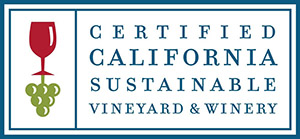We are stewards of the land.
Environment, Equity & Economics
St. Francis Winery & Vineyards operates according to the three pillars of sustainability: environment, equity, and economics. Each of these factors are considered in our business decisions. The goal - to share amazing wines and delicacies from the heart of Sonoma County while preserving this mecca for future generations.

Environment
Certified California Sustainable Producer
- St. Francis earned their sustainability certification in 2013, after a multi-year process, from the California Sustainable Winegrowing Alliance
- In 2014, St. Francis hired Vineyard Manager Jake Terrell, a nationally-recognized leader in green viticulture techniques and consultant on the Code of Sustainable Winegrowing Practices for the California Sustainable Winegrowing Alliance
Water Conservation
- Winery wastewater is cleaned and reused for irrigation
- Soil capacitance probes measure vineyard soil moisture at the root zone so we only irrigate when absolutely necessary reducing water usage by about 30% in 2014
- Large vineyard blocks have been broken into smaller blocks enabling us to target and irrigate smaller areas saving water and energy
- Hoses are fitted with low flow nozzles and flow meters at each water outlet measure and track water usage
Recycling Programs
- During harvest grape byproducts are recycled and reused locally as fertilizer
- Paper waste is picked up by a local business, shredded onsite and recycled locally
- Our Winery & barrel building roof structure was built from 70% recycled steel
- All food scraps from our kitchen are composted
Environmentally Responsible Packaging
- St. Francis wine bottles are made from over 45% recycled glass and cartons are comprised of over 55% recycled material
- St. Francis uses natural cork closures harvested from Cork trees that can live for hundreds of years with harvests every eight to nine years
Sensible Vineyard Management
- Leaf removal and deficit irrigation naturally reduces the threat of disease and pests
- Cover crop rotation in our vineyards increases biodiversity, improves soil health and increases its water holding capabilities
- We use locally sourced grapevines and compost in all of our estate vineyards
- Plant tissue analysis minimizes irrigation and fertilizer usage
Natural Resource Preservation
- Buffer zones and cover crops control erosion and protect the watershed
- Nesting boxes around the vineyard provide homes for raptors that naturally contain pests
- Fieldstone used for walls and drainage areas were naturally sourced from our Wild Oak Vineyard and building site
Equity
Quality of Life
- St. Francis offers annual health and wellness screenings to all employees
Creating a Wholesome Environment
- St. Francis Winery & Vineyards was named one of the top places to work by the NorthBay Business Journal for the past 14 years in a row
Commitment to our Community
- St. Francis employees dedicate their time to supporting the community and youth programs
Giving Back
- We support many animal related non-profit and charities including the Humane Society of Sonoma County and Canine Companions.
Economics
Renewable Energy
- Our 457 kilowatt solar electrical system provides us with over 40% of our annual electrical needs
Energy Efficiency
- Energy efficient T5 fixtures with 221 motion-sensors provide better visibility and use 55% less energy
- Computerized refrigeration monitors tanks for peaks and lows to adjust automatically and only cools wine when necessary
Harnessing Nature
- We utilize the natural foggy night air to cool our case goods and barrel storage areas
Composting Program
- Starting in 2020 St. Francis Winery & Vineyards began custom making its compost material by recycling pomace (discarded skins, pulp, seeds, and stems) from the production process with cow manure purchased from a local ranch. The material is mixed, cooked, and screened offsite, then returned to the vineyards in the Spring to replenish and maintain such nutrients as Nitrogen, Phosphorus and Potassium.
